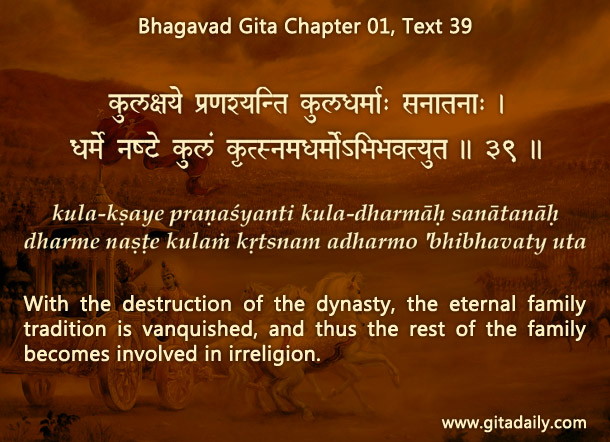In the Bhagavad-gita’s first chapter, Arjuna refuses to fight, giving several reasons for his unexpected choice. Arjuna’s actions may evoke a wide range of reactions among different people. At one extreme, some may call his actions cowardly: “He just lost his nerve and then rationalized his fear-driven decision.” At the other extreme, others may find his actions heroic: “He had the guts to pull out of a catastrophic war, even at the risk of losing face.” But neither view fathom the depth of Arjuna’s concerns.
To get a sense of those depths, let’s consider Arjuna’s deliberations on the ethics of fighting (01.31-45). Not once does he mention the key circumstantial cause of that war: the many indignities and atrocities that he and his brothers and especially his wife, Draupadi, had suffered at the hands of the Kauravas, whose leader Duryodhana remained remorseless and ruthless.
When we get into a fight with someone, we usually remember the wrongs they did to us and forget the wrongs we did to them. By such selective memory, we justify our actions against them, “I am only giving them what they deserve.”
Remarkably, Arjuna doesn’t succumb to this normal human tendency. To the contrary, he focuses on the fact that his opponents are his relatives. Even though he recognizes that they are blinded by greed (01.37), he doesn’t use their blindness as a justification to attack them. Instead, he thinks aloud whether in planning to attack them, he himself has become similarly blinded (01.38).
If doing the right thing means that he will have to die, unarmed and unresisting, he is ready to do that (01.45). Rather than do the wrong thing, he prefers to live by begging (02.05) Without being sure that he is doing the right thing, even the greatest success won’t solace him (02.08).
Arjuna’s words demonstrate his strong ethical sense: even when he has due reasons to fight, he still evaluates whether he is doing the right thing. Such a reflective person is eminently qualified to receive the Gita’s supremely reflective wisdom centered on determining the right thing to do.
One-sentence summary:
The Gita’s first chapter reveals Arjuna’s deep commitment to doing what is actually the right thing, not just doing what seems right.
Think it over:
- What are the various extreme reactions to Arjuna’s refusal to fight?
- What is remarkable about Arjuna’s deliberations on the ethics of fighting?
- What do Arjuna’s words reveal about his character?
***
01.39: O Janardana, why should we, who can see the crime in destroying a family, engage in these acts of sin?
To know more about this verse, please click on the image


Krishna is the best tuitor